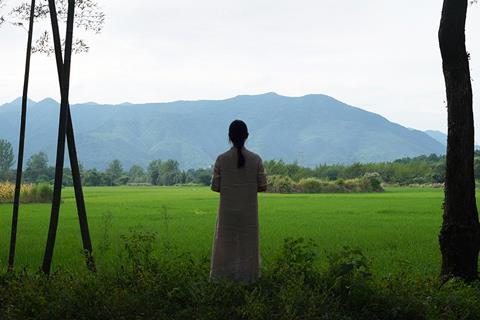
Mainland Chinese arthouse films have regained their footing on the international stage post-Covid, earning recognition and awards at top festivals worldwide. Titles selected for this year’s Toronto International Film Festival (TIFF) include Jia Zhangke’s Caught By The Tides and Lou Ye’s An Unfinished Film, both making their North American premieres after Cannes debuts, as well as the world premiere of Huo Xin’s debut featureBound In Heaven and the international premiere of Li Yang’s Escape From The 21st Century.
In addition, Jia’s wife, actress Zhao Tao, will receive the TIFF special tribute award. But various challenges await the potential of a theatrical release back home, from the lack of specialised arthouse cinemas to high p&a costs and audience consumption habits.
China has no shortage of theatres, with more than 86,000 screens across 12,000 cinemas in operation nationwide. But it is short on specialised venues essential for arthouse titles to enjoy a longer release and spread word-of-mouth to a wider audience. The National Alliance of Arthouse Cinemas (NAAC) — launched by the China Film Archive in 2016 to facilitate the release of Chinese and international arthouse films — has expanded its network to more than 2,600 cinemas with 3,100 screens across 311 cities. But these are still largely commercial theatres rather than dedicated arthouse venues.
Given such distribution restrictions, coupled with an economic slowdown and changing consumer behaviour post-pandemic, it was noteworthy that a trio of Chinese arthouse films stood out with distinctive box-office results last year.
Wang Jing’s social drama The Best Is Yet To Come, which first premiered at Venice and TIFF in 2020 and was produced by Jia, took $7.9m (rmb56.4m), while Kong Dashan’s Journey To The West grossed $9.4m (rmb67.2m), a quirky sci-fi with an unknown cast that was produced by Frant Gwo and premiered at Pingyao International Film Festival in 2021. The box office for both of these debut features was viewed as exceptional, especially given the time-lag between their festival premieres and local release as cinemas were closed for a significant period due to the pandemic, leading to a backlog of titles.
Only The River Flows (which set the record as director Wei Shujun’s third film to play in Cannes within four years) is understood to have achieved a historic high for a local arthouse film, taking $43.3m (rmb309m) at the box office and recording more than 7 million admissions following its release in October 2023.
High risk

The distribution investment in a country as vast as China can be extremely high, hence risky. “The cost difference for p&a between an art film and a commercial film might not be that much, but there’s a world of difference between their box office,” says Hangzhou Dangdang Film CEO Tang Xiaohui, producer of Only The River Flows. “It’s natural for distributors and cinema operators to allocate their resources on commercial films for higher box-office returns.”
The film, adapted from the short novel Mistakes By The River by Yu Hua, an immensely popular author whose total sales exceed 150 million in China, marks the first theatrical release of Hangzhou Dangdang Film, which focuses on literary adaptations. The sheer size of the Chinese market also means the complex distribution system usually involves multiple parties. Hangzhou Dangdang Film is a co-distributor of the film alongside Lian Ray Pictures and China Film Co.
The priority was to get the marketing right. “If the audience wasn’t given the right guidance for what the film is about, negative reviews like ‘incomprehensible’, ‘obscure’ and ‘slow-burning’ would surface,” says Tang. There were options to position Only The River Flows as a crime film, mystery feature or thriller — all elements of the story — but Tang and his team ended up taking the risk of labelling it an art film.
“Chinese audiences always associate a film without strong genre elements such as comedy, action or thriller as drama,” Tang explains. “Marketing a title as an art film is even more niche than a drama. But this extreme positioning paid off and attracted a large unique audience who enjoy thought-provoking films, as well as a general audience who felt the producers and distributors were sincere, not lying to them.”
Theatrical aside, streaming platforms offer alternative distribution options. Gu Xiaogang’s Dwelling In The Fuchun Mountains, which closed Critics’ Week at Cannes in 2019, was launched on Chinese streamer iQiyi in 2020, skipping the theatrical window.
Last year, Dwelling By The West Lake, the second part of the trilogy, played in Competition at Tokyo International Film Festival and saw Jiang Qinqin win best actress at the Asian Film Awards. Unlike the first film, it opened theatrically and earned a significant $16.8m (rmb120m) in April, maintaining the momentum for Chinese arthouse films.
Before the end of the summer season, a trio of Chinese independent films by emerging directors opened in late August. Their release may be small, securing just a fraction of the screenings booked by large commercial releases, but it is significant that they made it to cinemas at all.
Violet Du Feng’s Hidden Letters, an Oscar-shortlisted feature documentary that premiered at Tribeca and BFI London Film Festival in 2022, returned home two years later for an August 31 release through Shanghai Elemeet Network Technology, a specialist distributor of arthouse films and documentaries.
Elemeet turned to an unusual marketing approach, giving the public the opportunity to arrange advance screenings. Interested parties can initiate a screening through Elemeet’s online platform, even having the flexibility to pick the location, date, time and hall size. More than 40 such preview screenings for Hidden Letters had been held by press time. These included women-only screenings, as the documentary is about Nüshu, an ancient secret language of sisterhood.
“This approach is most suitable for non-commercial titles with p&a constraints,” says Xiao Fuqiu, who heads up publicity at Elemeet. “It allows us to begin previews and find our target audience to spread word of mouth in advance, and attract more media coverage.”
Choy Ji’s Borrowed Time, which premiered in Busan’s New Currents Competition in 2023, opened on August 27 as the latest title on NAAC’s line-up. In June, it was one of the first films played on the opening of the Jiangnan Center, located in Suzhou City — China Film Archive’s first branch outside Beijing for the screening of arthouse films.
“Distribution is a lot harder than making a film,” says Borrowed Time producer Mo Jinjin of Bocut Film. “We never realised that until now. Not all p&a companies are willing to front the distribution expenditure for arthouse films nowadays. If that’s the case, the production companies will have to do so, which makes it more challenging for arthouse filmmakers to get their films out.”
Mo was able to secure distribution funding support from the city of Guangzhou and Guangdong province where the majority of the film’s shoot took place. With its dialogue mainly in Cantonese, promotional tours focused on the Cantonese-speaking region in Guangdong province.
Home advantage
Localisation can also play a major role in box-office success. Shao Yihui’s feature debut B For Busy became a runaway success in late 2021 primarily because of the rare use of the Shanghainese dialect (before Wong Kar Wai’s hit series Blossoms Shanghai placed a spotlight on the dialect). The Shanghai area accounted for almost 40% of the film’s total box office of $36.4m (rmb260m).
B For Busy was developed and produced by MaxTimes (Hubei) after winning the MaxTimes Award at First International Film Festival’s financing project market in 2020. The Beijing-based company has been presenting this award — which has a prize of $14,000 (rmb100,000) — since 2018 to discover and nurture new talent. It will follow through the development and production of the winning projects and co-distribute them theatrically.
Previous MaxTimes Award winners include Long Fei’s Gold Or Shit, which garnered three prizes at Beijing International Film Festival in April — including best film — before scoring $14.3m (rmb102m) at the box office, and Zhang Yudi’s The Midsummer’s Voice, which won best screenplay in First International Film Festival’s main competition and opened theatrically on August 24.
“The increasing participation of younger audiences will change the market demand and screening arrangements for films,” says Yue Yang, co-founder and producer of MaxTimes. “Having arthouse cinemas will lend bigger support to art films. However, telling a good story is still key for art films to penetrate the commercial market.”























No comments yet